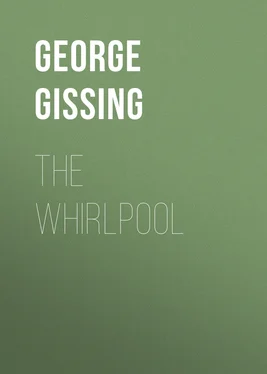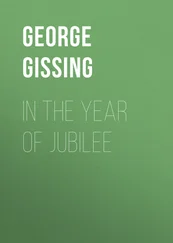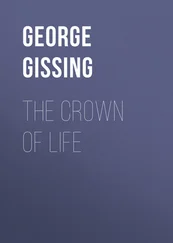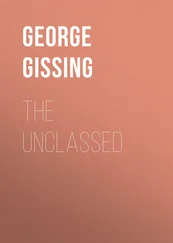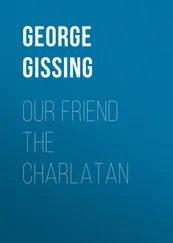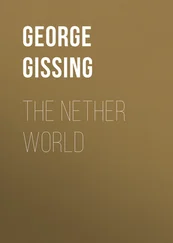George Gissing - The Whirlpool
Здесь есть возможность читать онлайн «George Gissing - The Whirlpool» — ознакомительный отрывок электронной книги совершенно бесплатно, а после прочтения отрывка купить полную версию. В некоторых случаях можно слушать аудио, скачать через торрент в формате fb2 и присутствует краткое содержание. Жанр: foreign_prose, literature_19, foreign_antique, на английском языке. Описание произведения, (предисловие) а так же отзывы посетителей доступны на портале библиотеки ЛибКат.
- Название:The Whirlpool
- Автор:
- Жанр:
- Год:неизвестен
- ISBN:нет данных
- Рейтинг книги:4 / 5. Голосов: 1
-
Избранное:Добавить в избранное
- Отзывы:
-
Ваша оценка:
- 80
- 1
- 2
- 3
- 4
- 5
The Whirlpool: краткое содержание, описание и аннотация
Предлагаем к чтению аннотацию, описание, краткое содержание или предисловие (зависит от того, что написал сам автор книги «The Whirlpool»). Если вы не нашли необходимую информацию о книге — напишите в комментариях, мы постараемся отыскать её.
The Whirlpool — читать онлайн ознакомительный отрывок
Ниже представлен текст книги, разбитый по страницам. Система сохранения места последней прочитанной страницы, позволяет с удобством читать онлайн бесплатно книгу «The Whirlpool», без необходимости каждый раз заново искать на чём Вы остановились. Поставьте закладку, и сможете в любой момент перейти на страницу, на которой закончили чтение.
Интервал:
Закладка:
Ha! There indeed sounded the violin! It needed no technical intelligence to distinguish between the playing of Wilenski and that of Alma Frothingham. Her religion, forsooth! Herr Wilenski, one might be sure, talked little enough about his 'religion'. What did Alma think as she listened? Was she overcome by the despair of the artist-soul struggling in its immaturity? Or did she smile, as ever, and congratulate herself on the five hours a day, and tell herself how soon she would reach perfection if there were real necessity for it? Hopeless to comprehend a woman. The senses warred upon the wit; seized by calenture, one saw through radiant mists.
He did not like the name 'Alma'. It had a theatrical sound, a suggestion of unreality.
The maestro knew his audience; he played but for a quarter of an hour, and the babble of tongues began again. Rolfe, sauntering before the admirable pictures which hung here as a mere symbol of wealth, heard a voice at his shoulder.
'I'm very thirsty. Will you take me down?'
His heart leapt with pleasure; Alma must have seen it in his eyes as he turned.
'What did Wilenski play?' he asked confusedly, as they moved towards the staircase.
'Something of Grieg's Mr. Wilbraham is going to sing "Wie bist du, meine Koniginn"—Brahms, you know. But you don't really care for music.'
'What an astounding accusation!'
'You don't really care for it. I've known that since we were at Leipzig.'
'I have never pretended to appreciate music as you do. That needs education, and something more. Some music wearies me, there's no denying it.'
'You like the Melody in F?'
'Yes, I do.'
Alma laughed, with superiority, but not ill-naturedly.
'And I think it detestable—but of course that doesn't matter. When I talk about books you think me a nincompoop.—That word used to amuse me so when I was a child. I remember laughing wildly whenever I saw or heard it. It is a funny word, isn't it?'
'The last I should apply to you,' said Rolfe in an absent undertone, as he caught a glimpse of the white teeth between her laughing lips.
They entered the supper-room, where as yet only a few people were refreshing themselves. Provisions for a regiment spread before the gaze; delicacies innumerable invited the palate: this house was famed for its hospitable abundance. Alma, having asked her companion to get her some lemonade, talked awhile with two ladies who had begun to eat and drink in a serious spirit; waiting for her, Rolfe swallowed two glasses of wine to counteract a certain dullness and literalness which were wont to possess him in such company.
'I won't sit down,' she said. 'No, thanks, nothing to eat. I wonder where Papa is? Now, he enjoys music, though he is no musician. I think Papa a wonderful man. For years he has never had more than six hours sleep; and the work he does! He can't take a holiday; idleness makes him ill. We were down in Hampshire in July with some relatives of Mamma's—the quietest, sleepiest village—and Papa tried to spend a few days with us, but he had to take to flight; he would have perished of ennui.'
'Life at high pressure,' remarked Rolfe, as the least offensive comment he could make.
'Yes; and isn't it better than life at low?' exclaimed the girl, with animation. 'Most people go through existence without once exerting all the powers that are in them. I should hate to die with the thought that I hadn't really lived myself out . A year ago Papa took me into the City to see the offices of Stock and Share , just after the paper started. It didn't interest me very much; but I pretended it did, because Papa always takes an interest in my affairs. But I found there was something else. After we had seen the printing machinery, and so on, he took me up to the top of the building into a small room, where there was just a table and a chair and a bookshelf; and he told me it was his first office, the room in which he had begun business thirty years ago. He has always kept it for his own, and just as it was—a fancy of his. There's no harm in my telling you; he's very proud of it, and so am I. That's energy!'
'Very interesting indeed.'
'I must go up again,' she added quickly. 'Oh, there's miss Beaufoy; do let me introduce you to Miss Beaufoy.'
She did so, unaware of Rolfe's groaning reluctance, and at once disappeared.
The supper-room began to fill. As soon as he could escape from Miss Beaufoy, who had a cavalier of her own, Harvey ascended the stairs again, and found a quiet corner, where he sat for a quarter of an hour undisturbed. Couples and groups paused to talk near him, and whenever he caught a sentence it was the merest chatter, meaningless repetition of commonplaces which, but for habit, must have been an unutterable weariness to the least intelligent of mortals. He was resolved never to come here again; never again to upset his peace of mind and sully his self-respect by grimacing amid such a crowd. He enjoyed human fellowship, timely merry-making; but to throng one's house with people for whom, with one or two exceptions, one cared not a snap of the fingers, what was this but sheer vulgarism? As for Alma Frothingham, long ago he had made up his mind about her. Naturally, inevitably, she absorbed the vulgarity of her atmosphere. All she did was for effect: it was her cue to pose as the artist; she would keep it up through life, and breathe her last, amid perfumes, declaring that she had 'lived herself out'.
In his peevishness he noticed that women came up from supper with flushed cheeks and eyes unnaturally lustrous. What a grossly sensual life was masked by their airs and graces! He had half a mind to start tomorrow for the Syrian deserts.
'Do let us see you again soon,' said his hostess, as he took leave of her. 'Come in at five o'clock on Wednesday, that's our quiet day; only a few of our real friends. We shall be in town till Christmas, for certain.'
On the stairs he passed Mr. Felix Dymes, the composer of 'Margot'.
'Oh, it's the easiest thing in the world,' Mr. Dymes was saying, 'to compose a song that will be popular. I'll give you the recipe, and charge nothing You must have a sudden change to the minor, and a waltz refrain—that's all. Oh yes, there's money in it. I know a man who–'
Rolfe had never left the house in such a bad temper.
CHAPTER 5
When he awoke next morning, the weather was so gloomy that he seriously resumed his thought of getting away from London. Why, indeed, did he make London his home, when it would be easy to live in places vastly more interesting, and under a pure sky? He was a citizen of no city at all, and had less desire than ever to bind himself to a permanent habitation. All very well so long as he kept among his male friends, at the club and elsewhere; but this 'society' played the deuce with him, and he had not the common-sense, the force of resolve, to keep out of it altogether.
Well, he must go to his bank this morning, to draw cash.
It was about twelve o'clock when he stood at the counter, waiting with his cheque. The man before him talked with the teller.
'Do you know that the "Britannia" has shut up?'
'The bank? No!'
'But it has. I passed just now, and there were a lot of people standing about. Closed at half-past eleven, they say.
Harvey had a singular sensation, a tremor at his heart, a flutter of the pulses, a turning cold and hot; then he was quite calm again, and said to himself, 'Of course.' For a minute or two the quiet routine of the bank was suspended; the news passed from mouth to mouth; newcomers swelled a gossiping group in front of the counter, and Harvey listened. The general tone was cynical; there sounded scarcely a note of indignation; no one present seemed to be personally affected by the disaster. The name of Bennet Frothingham was frequently pronounced, with unflattering comments.
Читать дальшеИнтервал:
Закладка:
Похожие книги на «The Whirlpool»
Представляем Вашему вниманию похожие книги на «The Whirlpool» списком для выбора. Мы отобрали схожую по названию и смыслу литературу в надежде предоставить читателям больше вариантов отыскать новые, интересные, ещё непрочитанные произведения.
Обсуждение, отзывы о книге «The Whirlpool» и просто собственные мнения читателей. Оставьте ваши комментарии, напишите, что Вы думаете о произведении, его смысле или главных героях. Укажите что конкретно понравилось, а что нет, и почему Вы так считаете.
